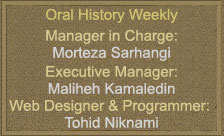| No. 468 | 8 December 2020 |
Proximity in a Strange Land-4On March/April 2019, a precipitation system in two waves from 25 to 29 March and also from 31 March to 2 April, caused floods and damage in the cities of Lorestan. In these rainfalls, tolls such as landslide and submerging parts of Dorud, Khorramabad, Mamolan, and Pol-e Dokhtar cities were reported. Following the flood in these areas, in addition to the Housing Foundation of Islamic Revolution, Iranian Army (Artesh), and IRGC, some ...Book Review:Leader MosqueThe oral history of Keramat Mosque"Leader Mosque" is the title of the book on the oral history of the Keramat Mosque, which has been prepared in the Oral History Unit of the Cultural Front of the Islamic Revolution. The research and interviews of this work were conducted by Ahmad Asgari, Seyed Mohammad Amir Ahmadi Tabatabai, and Hossein Soltani and were written by Morteza Ansarizadeh. This is the first book about the mosques of the revolution and ...Matketing of Oral History Works; Opportunity or ThreatConsidering the needs of the audience and the need to sell more cultural works and deliver goods to the consumer, marketing of all goods, including cultural goods, is one of the components of cultural economy which affect many cultural areas and add fuel to competition in this field. "The introduction of concepts such as cultural industries, cultural goods, and the cultural market into the social science literature indicates a phenomenon which ...Kobra Ahmadi War MemoriesMemoirs of Basiji Women during the WarThe early years of Kobra Ahmadi, who has been involved in cultural and social activities for many years, coincided with the victory of the Islamic Revolution and the beginning of the war imposed by Saddams army against Iran. Hearing the war march, led this young Basiji woman to the war support headquarters from the very first days when the enemy launched invasion. A reporter for the Iranian Oral History website interviewed ... Oral History Weekly Magazine Aims and Regulations
Oral History Weekly Magazine wishes to create a suitable place for thoughts and idea development; Its main field would be “Oral History” and subjects as telling & writing memoirs, writing diaries, travelogues, chronologies, and all other subfields of history which are presented in the form of news, articles, reports, notes, interviews and memoirs can be included. There is no limitation on the length of would-be-sent materials. Mentioning the name, academic background and email is necessary. Articles with complete references and bibliography are more credited and an abstract would quite helpful. Weekly is not about to publish any material consisting insults and libels about other people or anything that brings anxiety to public opinion. Weekly can edit and translate the received materials. The published articles and materials are only the writer’s ideas and Oral History Weekly Magazine has no responsibility about their content. |
 SABAH (39) Memoirs of Sabah Vatankhah Interviewed and Compiled by Fatemeh Doustkami Translated by Natalie Haghverdian Published by Soore Mehr Publishing Co. Persian Version 2019
Zahra broke the news of Alis martyrdom to her uncle early in the morning and brought him to the mosque. Then she asked Hassan, Abdollah Maavi, and me to accompany her uncle to the morgue and claim Alis body. She was worried that the process of looking for a vehicle to take her family to Sarbandar might take long and the authorities at morgue would bury Ali as unknown martyr.    |
